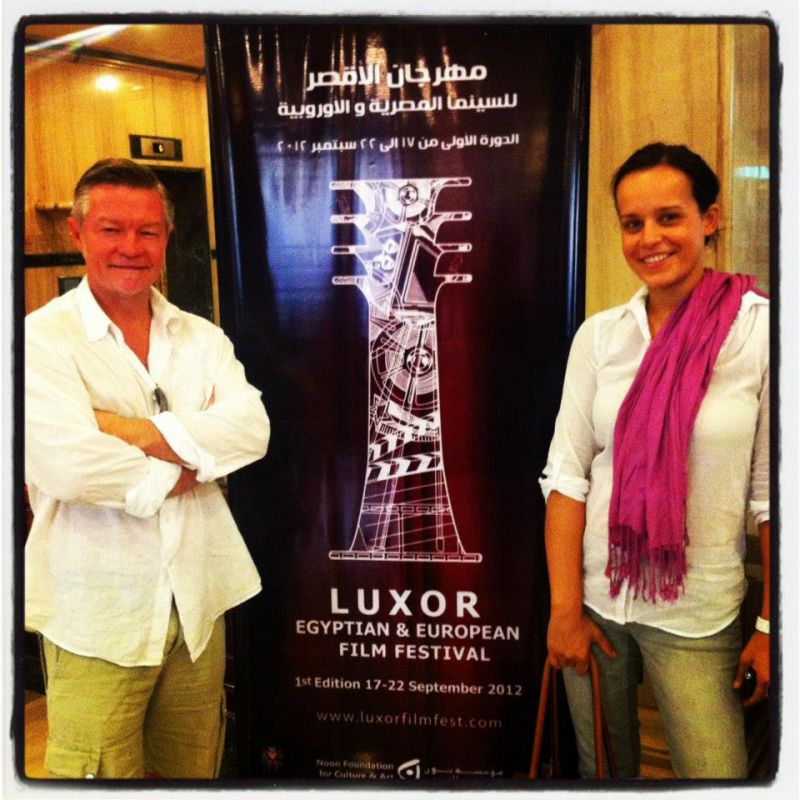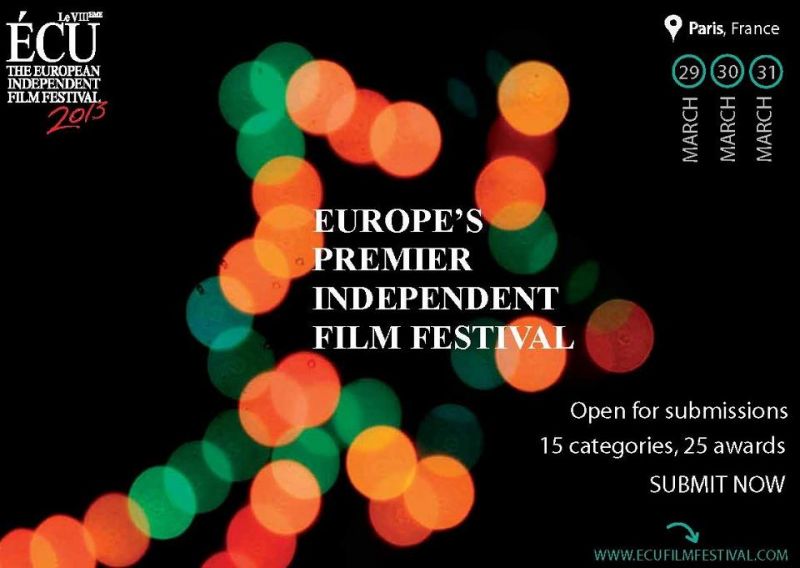|
|
||
|
Pro Tools
FILMFESTIVALS | 24/7 world wide coverageWelcome ! Enjoy the best of both worlds: Film & Festival News, exploring the best of the film festivals community. Launched in 1995, relentlessly connecting films to festivals, documenting and promoting festivals worldwide. Working on an upgrade soon. For collaboration, editorial contributions, or publicity, please send us an email here. User login |
Non-Multiplex Cinemaby Stephanie Carrera By chance in August 2010, I went to a short-film festival and networking event called “Films in the City,” hosted by a London group called Non-Multiplex Cinema. It was at this fun, casual night that I got the chance to view two talented French filmmakers’ directorial debut, The Red Balloon. Despite this being their first directing effort, however, Alexis Wajsbrot and Damien Mace are no strangers to the film business. Both have worked in the visual arts industry for years, most recently in London, and have been on their share of big-time movie sets, including that of Tim Burton’s Sweeney Todd, where the two first met. Damien says, “We share a passion for movies and we wanted to direct movies, we wanted to tell our story.” The story of Red Balloon arose from an impetus to prove themselves as filmmakers with skills other than their visual effects abilities. They were in search of a simple story that would allow them to create atmosphere in the film, and over a lunch break, they came up with an urban legend. “We were trying to show that we can direct in a traditional way. We didn’t want to make [the visual effects] too obvious, but just subtle and to serve a point. To serve the movie rather than to be like a big expensive thing that kind of blows your mind. I think actually we managed to do well. It’s not overly CG and sometimes people didn’t even notice that it was CG everywhere,” says Damien. So how did these two assemble a cast and crew on a budget? “Well, this was the complicated part for us all,” Alexis told me. “We first did it the normal way, we wanted to find a production company and we started in France actually, but this took a lot of time. A lot of the money went to the camera because we shot on the RED camera. So it was a big motivation for the crew, it was a big deal. And we also motivated the crew by the script. We shot the movie over one year ago. At this time the RED cam was very rare. Everyone was attracted by a chance to use it.” Damien adds, “But then [the French production company] was to enter a competition, with Canal 2, and it was a really slow process. And I think it was quite hard for us. Again and again people were asking, ‘What did you do before?’ So we ended up using our connections in London and abandoned the French way. Here in London we met the director who just finished directing a feature film. He wanted some help on his visual effects and we wanted some help on our crew so we made a deal, we said: ‘we will help you with our visual effects if you will help us with our crew’. We had, apart from the RED camera, a steady cam that could handle the RED cam-it was 100,000 pounds. We had a crane that was from the Doctor Who series. The crew was absolutely professional. They came with materials, so it was very very cool.“ Alexis and Damien have learned a lot from the festival circuit. They kicked off the season at Cannes, and have been to Berlin, London Film 45 Festival, Festival de Coeur near Lyon, and even won the directorial discovery award at the Rhode Island Horror Festival. Through this all, they have gained contacts, visibility, and the gratification of seeing audiences react to their film, including an audience of over 2000 in Leicester Square. Despite the fact that the two work outside of their home country of France, Alexis says he loves it nonetheless: “All the French directors [I meet] are also very inspiring, very creative.” The French natives are positive about an independent film festival taking place in the heart of Paris. They see it as another excuse to go to Paris, and a refreshing chance to see filmmakers outside of a main event like Cannes. They also believe that Paris is a great place to make contacts, since the majority of French production companies are in Paris. Next up for the duo is special effects work on the new HBO series, Game of Thrones, as well as some work on a film called Gravity for the company Filmstore. But they are also working on a feature film script, and hope to make a living out of directing one day. With obvious talent, endless French charm, and a passion for their craft, we will most certainly be seeing the next feature from Alexis Wajsbrot and Damien Mace in the near future. /// par Stephanie Carrera Au mois d’août dernier, j’ai eu l’occasion de me rendre à un festival de courts métrages et d’interconnexions appelé «Films in the City», au sein du groupe londonien Non-Multiplex Cinema. C’est à cette soirée amusante et sympathique que j’ai eu la chance de rencontrer deux talentueux cinéastes français débutants, les Red Balloon. Malgré le fait que ce soit leur premier travail en tant que réalisateurs, Alexis Wajsbrot et Damien Mace n’en sont pas à leur premier coup d’essai dans le cinéma. Tous deux ont travaillé pendant des années dans l’industrie des arts visuels et plus récemment à Londres, en contribuant au tournage de grands films, comme Sweeney Todd de Tim Burton où ils se sont rencontrés. Damien l’affirme, «Nous partageons une passion pour les films et nous souhaitons en réaliser pour raconter notre histoire.» L’histoire de Red Balloon émane d’une envie de mettre en avant leur travail en tant que cinéastes avec d’autres compétences que leur compétence en matière d’effets visuels. Ils étaient à la recherche d’une histoire assez simple qui leur permettrait de créer une certaine atmosphère, et après une pause déjeuner, ils se sont mis d’accord sur une idée de légende urbaine. «Nous avons essayé de montrer que nous pouvions réaliser ce film sous une forme traditionnelle. Nous ne voulions pas d’effets visuels trop flagrants, mais juste subtils et qui puissent être à même de soutenir nos idées. Privilégier un bon film plutôt qu’un projet trop excessif qui vous traverse l’esprit. Je pense vraiment que nous avons bien réussi. Ce n’est pas excessivement axé sur les images de synthèse et parfois les gens n’ont pas remarqué qu’elles étaient omniprésentes», confie Damien. Alors comment vous êtes-vous accordés pour le budget des acteurs et de l’équipe? «Eh bien, cela a été la partie compliquée pour nous deux», me dit Alexis. «Nous avons d’abord commencé d’une façon classique, nous étions à la recherche d’une société de production et nous avons véritablement commencé en France, mais cela prenait beaucoup de temps. Beaucoup d’argent a été investi dans l’achat des caméras car nous filmions avec une RED caméra. C’était une grande motivation pour l’équipe, une belle occasion. Et nous avons aussi su séduire l’équipe grâce au scénario. Nous avons tourné le film il y a plus d’un an. Et cette RED caméra était très rare. Chacun était attiré par la chance de l’utiliser.» Damien ajoute, «Mais après la société de production française est entrée en compétition, avec Canal 2, et cela a pris beaucoup de temps. Et je pense que cela a été plutôt difficile pour eux. Des personnes demandaient encore et encore «Que faisiez-vous avant?» Alors nous avons mis fin à nos relations à Londres et quitté la voie française. Ici à Londres, nous avons rencontré un réalisateur qui venait juste de terminer la réalisation d’un long-métrage. Il recherchait de l’aide pour ses effets visuels et nous recherchions de l’aide pour notre équipe alors nous avons conclu un marché. Nous avons dit: « nous vous aiderons pour vos effets visuels si vous nous aidez pour notre équipe». Nous avions, en dehors de la RED caméra, une caméra fixe, la RED caméra pouvant coûter jusqu’à 120 000 euros. Nous avions une grue qui venait de la série Doctor Who. L’équipe était absolument professionnelle. Ils sont venus avec leur matériel, c’était super.» Alexis et Damien ont beaucoup appris dans le circuit de ce festival. Ils ont terminé la saison à Cannes, sont allés à Berlin, au London Film 45 Festival, au Festival de Coeur près de Lyon, et ont également remporté le prix de la découverte directoriale au Festival de l’Horreur de Rhode Island. Grâce à tout cela, leur nombre de contacts et leur visibilité ont augmenté, tout comme leur satisfaction de voir les spectateurs sensibles à leur film avec une audience de plus de 2000 personnes au square de Leicester. En dépit du fait que tous deux travaillent en dehors de leur pays d’origine, la France, Alexis dit qu’il aime néanmoins cela, «Tous les réalisateurs français (que j’ai rencontré) sont tous très inspirés, très créatifs». Les français d’ici sont très positifs quant à un festival du cinéma indépendant qui se déroulera au cœur de Paris. Ils voient cela comme une autre excuse de venir à Paris et pour offrir la possibilité de rencontrer des réalisateurs en dehors d’un grand évènement comme Cannes. Ils pensent aussi que Paris est un bon endroit pour se faire des contacts principalement depuis que la majorité des sociétés de productions se trouvent dans Paris. Concernant le futur de ce duo, un travail dans les effets spéciaux dans la nouvelle série d’HBO, Game of Thrones, tout comme un travail sur un film appelé Gravity pour la société Filmstore, sont en cours. Mais ils travaillent également sur le scénario d’un long métrage et espèrent gagner leurs vies de la direction un jour. Un talent évident, un charme français sans fin et une passion pour leur métier, voici à l’avenir les caractéristiques que nous entendrons très probablement à propos d’Alexis Wajsbrot et Damien Mace. 10.01.2011 | ÉCU-The European Independent Film Festival's blog Cat. : Alexis Wajsbrot Alexis Wajsbrot Berlin Burton’s Sweeney Todd By Cannes City Damien Mace Damien Mace ecufilmfestival European Independent Film Festival Films in the City Filmstore France Island Leicester London Londres Lyon Non Non-Multiplex Cinema Paris Rhode Island Stephanie Carrera Stephanie Carrera Sweeney Todd de Tim Burton The Red Balloon FESTIVALS
|
LinksThe Bulletin Board > The Bulletin Board Blog Following News Interview with EFM (Berlin) Director
Interview with IFTA Chairman (AFM)
Interview with Cannes Marche du Film Director
Filmfestivals.com dailies live coverage from > Live from India
Useful links for the indies: > Big files transfer
+ SUBSCRIBE to the weekly Newsletter Deals+ Special offers and discounts from filmfestivals.com Selected fun offers
> Bonus Casino
User imagesAbout ÉCU-The European Independent Film Festival Hillier Scott Hillier Scott (ECU)
Scott Hillier, Founder and President of ÉCU - The European Independent Film Festival
Scott Hillier is a director, cinematographer, and screenwriter, based in Paris, France. In the last 20 years, Hillier has gained international recognition from his strong and incredible cinematography, editing, writing, producing and directing portfolio in both the television and film industries.
Scott began his career in the television industry in Australia. In 1988, he moved to London getting a job with the BBC who then set him to Baghdad. This opportunity led him to 10 years of traveling around world for the BBC, mainly in war zones like Somalia, Bosnia, Tchetcheynia, Kashmir, and Lebanon. After a near fatal encounter with a Russian bomber in Tchechnyia, Hillier gave up his war coverage and began in a new direction.
He moved to New York City in 1998. He directed and photographed eight one-hour documentaries for National Geographic and The Discovery Channel. Based on his war knowledge and experience, Hillier wrote and directed a short film titled, “Behind the Eyes of War!" The film was awarded “Best Short Dramatic Film” at the New York Independent Film and TV Festival in 1999. From that he served as Supervising Producer and Director for the critically acclaimed CBS 42 part reality series, "The Bravest” in 2002 and wrote and directed a stage play called, "Deadman’s Mai l," which ran at Le Théâtre du Moulin de la Galette in Paris during the summer of 2004. He then became the Director of Photography on a documentary titled, “Twin Towers." This was yet another life changing experience for Hillier. The riveting documentary won an Academy Award for "Best Documentary Short Subject" in 2003. In 2004, Hillier changed continents again, spending three months in Ethiopia. He produced “Worlds Apart,” a pilot for ABC America / True Entertainment / Endemol. As you can see, Hillier was and is always in constant movement and enjoys working in a number of diverse creative areas including documentaries, music videos, commercials, feature and short films.
Scott studied film at New York University and The London Film and Television School. He also studied literary non-fiction writing at Columbia University. Hillier's regular clients include the BBC, Microsoft, ABC, PBS and National Geographic. Between filming assignments, he used to teach film, a Masters Degree course in Screenwriting at the Eicar International Film School in Paris, France and journalism at the Formation des Journalistes Français in Paris, France.
View my profile Send me a message The EditorUser contributionsUser links |




























